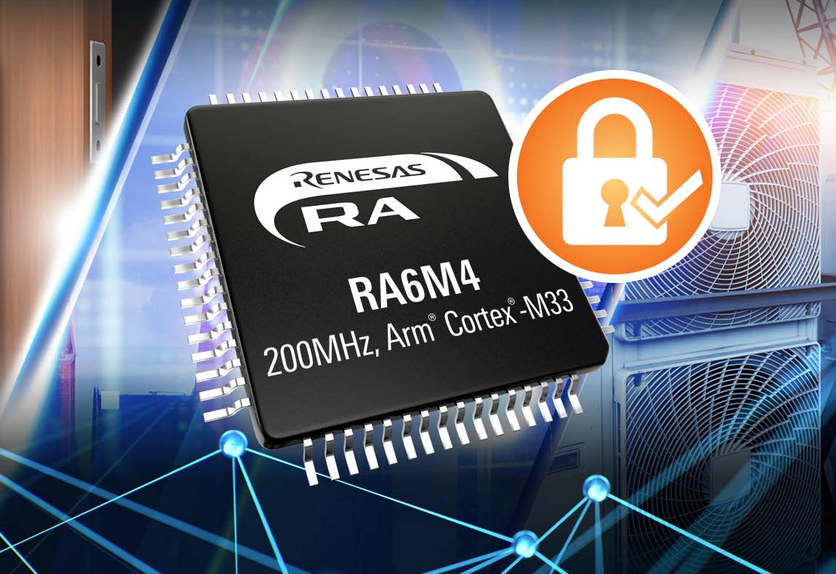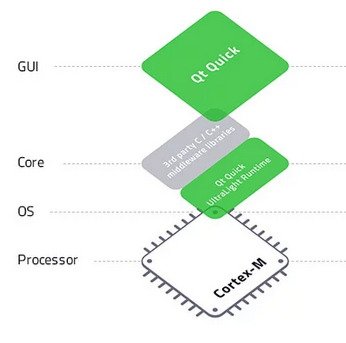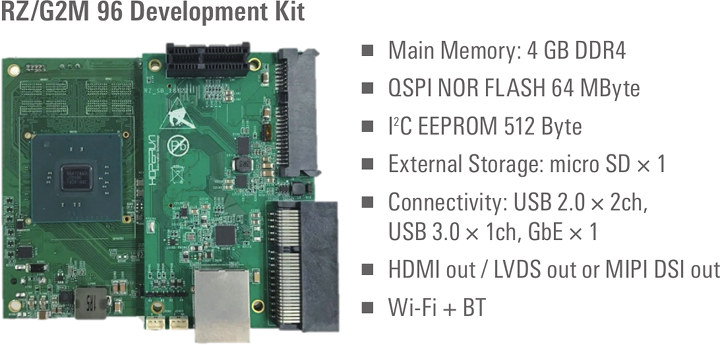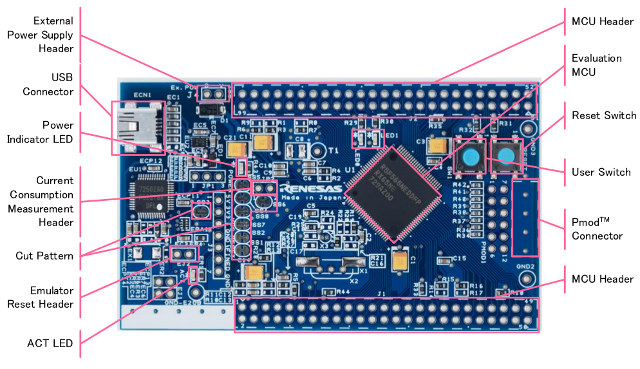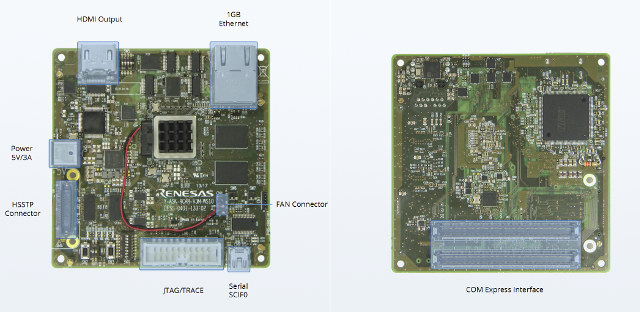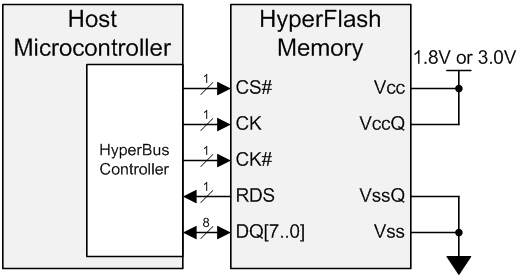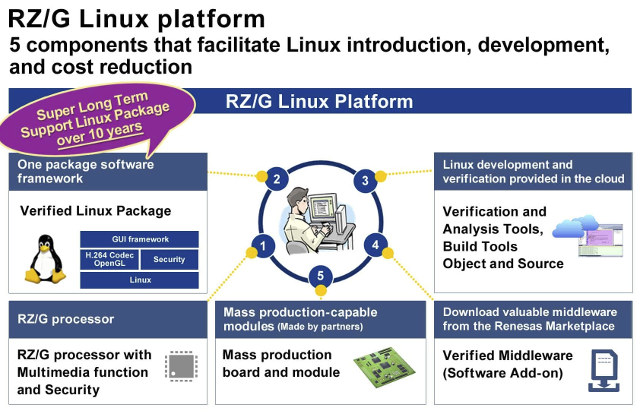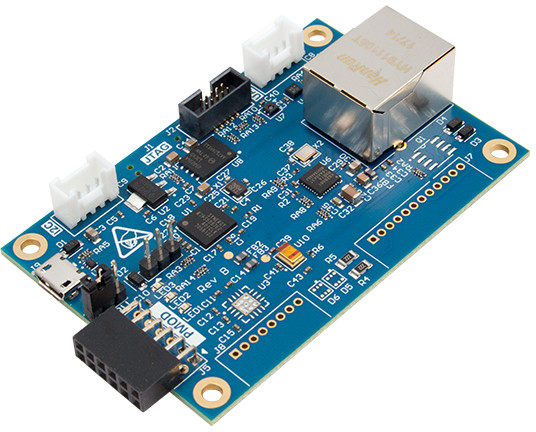Arm Cortex-M33 core with Arm Trustzone security was first unveiled in 2016, and since then several silicon vendors introduced secure Cortex-M33 microcontrollers with, for instance, Nordic nRF91 LTE-IoT SoC, STMicro STM32L5 MCU family, or NXP LPC551x/S1x. Renesas has now added one more alternative with RA6M4 Cortex-M33 microcontroller family clocked at up to 200 MHz with increased performance and security compared to their earlier Cortex-M4 RA6 microcontrollers clocked at 120 Mhz. Key features for RA6M4 microcontrollers: MCU Core – Arm Cortex-M33 @ 200 MHz with TrustZone technology Memory – 256 KB RAM include 64KB ECC RAM Storage – 512-1024 embedded flash, QuadSPI, and OctaSPI memory interface Networking – Ethernet controller with DMA USB – USB 2.0 Full Speed and CAN Other Peripherals Capacitive touch sensing unit SCI (UART, Simple SPI, Simple I2C), and SPI/ I2C multi-master interface SDHI and SSI (Serial Sound Interface) Security Renesas’ Secure Crypto Engine supporting multiple symmetric […]
Qt for MCUs – Qt Announces support for Microcontrollers
[Update August 24, 2019: Added information about expected release date and license] About Qt for MCUs Qt- The well known opensource toolkit for creating graphical interface announced their new release: Qt for MCUs, targeting MCU’s. The new graphical toolkit will be capable of running on devices without operating system. This may be a game changer in the entire MCU world, since Qt for MCUs allows developers to create fluid user interfaces on cost-effective micro controllers. This means we will be able to see smartphone like GUI’s which are running on low-end MCU’s with limited resources. With reference to their press release, assuring that Qt-GUI will consume less power to save the battery life. Qt for MCUs Software Stack While developing any applications for MCU, developers still can use their powerful declarative UI language QML and rich set of ready-made Qt Quick controls. And the C++ APIs, helps the user interface […]
Renesas RZ/G2 64-Bit MPUs Target Industrial Applications Leveraging SLTS Linux
Renesas RZ/G1 Cortex-A15/A7 processor series was introduced in 2016 targeting industrial human machine interface, and RZ/G1M was one the the first processors supported by the industrial-grade CIP Super Long-Term Support (SLTS) Linux kernel – as part of Renesas RZ/G Linux Platform – with commitment of over 10 years of support. The company has now launched a 64-bit version of the industrial processors with Renesas RZ/G2 family featuring up to eight Cortex-A53/A57 cores and supported by RZ/G Linux Platform for long term Linux support. Renesas RZ/G2 family is now comprised of four SKUs with the following key features and specifications. RZ/G2 Series RZ/G2E RZ/G2N RZ/G2M RZ/G2H Economical Mid-Range (Pin Compatible) Highest Performance CPU (64-bit ARMv8A) 2x Cortex-A53 @ 1.2GHz L1, L2 Parity/ECC 2x Cortex-A57 @ 1.5GHz L1, L2 Parity/ECC 2x Cortex-A57 @ 1.5GHz 4x Cortex-A53 @ 1.2GHz L1, L2 Parity/ECC 4x Cortex-A57 @ 1.5GHz 4x Cortex-A53 @ 1.2GHz L1, L2 Parity/ECC […]
Low Cost Renesas Target Boards for RX MCUs are Designed for Home Appliances, Building & Industrial Automation
Renesas Electronics has announced three new Target Boards for the RX65N, RX130 and RX231 32-bit Microcontroller (MCU) groups designed for home appliance, building and industrial automation applications. Each board has minimal features with an on-chip debugger, a mini USB port, the micro-controller, and through-hole pin headers providing access to all MCU signals. This design allows to access all MCU features while keeping the price below $30. Renesas Target Board specifications: MCU Renesas RX65N (R5F565NEDDFP) 32-bit RXv2 MCU @ 120 MHz with 2MB+32KB ROM, 640KB RAM Renesas RX130 (R5F51308ADFP) 32-bit MCU @ 32 MHz with 512KB+8KB ROM, 48 KB RAM Renesas RX231 (R5F52318ADFP) 32-bit RXv2 MCU @ 54 MHz with 512KB+8KB ROM, 64 KB RAM Expansion Unpopulated 12-pin Pmod connector 2x unpopulated 50-pin MCU headers Misc 2-pin Current measurement header Reset and user push buttons Power LED (Green), ACT LED (Green), 2x user LEDs (Green) 2-pin emulator reset header Power Supply […]
Renesas R-Car M3 Starter Kit is Designed for ADAS Applications
Most boards targeting the automotive market are impossible to purchase by individual, so last year I was pleasantly surprised when I discovered Renesas R-Car M2 Porter Linux automotive infotainment development board was available for sale on Digikey, and had good documentation on eLinux.org. The company has now introduced another automotive board, namely R-Car V3M starter kit, that’s not designed for infotainment, but instead for ADAS (Advanced Driver Assistance Systems) or even AD (Automated Driving) applications. Specifically, the board is supposed to “accelerate the development of New Car Assessment program (NCAP), front camera applications, surround view systems, and lidars” leveraging the company’s R-Car V3M image recognition SoC. Renesas R-Car V3M starter kit (V3MSK) specifications: SoC – Renesas R-Car V3M processor with two Cortex A53 64-bit cores @ up to 800 MHz, a dual lockstep Cortex-R7 32-bit core @ up to 800 MHz, IMP-X5-V3M image recognition engine System Memory – 448KB RAM on-chip; […]
Octo SPI / HyperBus Interface is Designed for High Speed Serial Flash, RAM, and MCP
So far, if you needed high speed storage with low pin count in your MCU based board, you could use QSPI (Quad SPI) NOR flash, but earlier this month I wrote about STM32L4+ MCU family, which added two Octo SPI interfaces. I had never heard about Octo SPI previously. Those two interfaces can be used with single, dual, quad, or octal SPI compatible serial flash or RAM, and support a frequency of up to 86 MHz for Octal SPI memories in STM32L4+ MCU. STMicro OctoSPI interface also supports Cypress/Spansion Hyperbus mode to connect to HyperFlash or HyperRAM chip, or even HyperFlash + HyperRAM Multi-Chip packages (MCP), and variable or fixed external memory latency as defined by the Hyperbus protocol specification. The latter reveals Hyperbus supports performance up to 400 MB/s (provided the controller support 200 MHz), and relies on either 11 bus signals using 3.0V I/O (Single-ended clock CK), or […]
Renesas RZ/G Linux Platform features CIP Super Long-Term Support (SLTS) Linux kernel
In the consumer space, some devices never get updated, and you can consider yourself lucky if the manufacturer provides updates for several years, often just two as Linux LTS (Long Term Support) kernels had been supported that long so far. Google and the Linux Foundation realized that was not enough, so they recently announced 6-year LTS kernels at Linaro Connect SFO 2017, starting with Linux 4.4 released on January 2016, meaning it will keeping being maintained until January 2022 with security patchsets and bug fixes. But in the industrial/embedded space, they need even longer periods of support due to the longer equipment’s lifespan. I first heard about the Linux Foundation’s Civil Infrastructure Platform (CIP) project last year, when I covered the schedule for the Embedded Linux Conference Europe 2016. The project aims at providing a super long-term supported (STLS) open source “base layer” for industrial grade software. Several companies are […]
Renesas S5D9 IoT Fast Prototyping Board Combines Cortex M4F MCU, Sensors, and Ethernet
Renesas S5D9 IoT Fast Prototyping board is a board designed – as its name implies – for the Internet of Things, with the company’s Synergy S5D9 ARM Cortex-M4F micro-controller, various sensors, various I/Os including protected digital inputs and outputs, and Ethernet for network connectivity instead of a Bluetooth or/and WiFi module. Renesas S5D9 board specifications: MCU – Renesas Synergy S5D9 ARM Cortex M4F MCU @120MHz with 2MB flash and 640KB SDRAM Storage – 256Mbits (32MB) QSPI NOR flash Connectivity – 1x 10/100Mbps Ethernet (RJ45) USB – 1x micro USB Full Speed port Sensors Bosch BMC150 6-Axis sensor (digital compass) AMS ENS210 environmental sensor for temperature and humidity data TE Connectivity MS5637-02BA03 barometric pressure sensor Knowles SPU0414HR5H-SB amplified SiSonic microphone Expansion 1x PMOD connector (SPI) 2x Grove Connectors (UART, I2C, GPIO) 2x Protected Digital Input (5.1V to 24V) + 2x Buffered Digital Output (up to 1A) via Molex 12 position header […]


